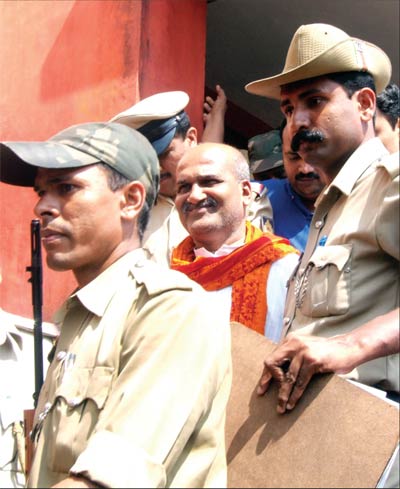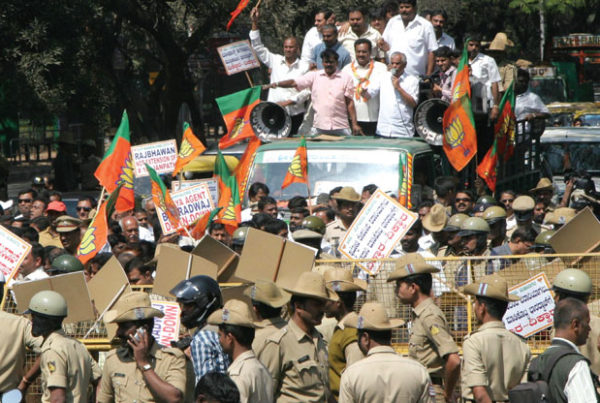Investigations: Pushp Sharma | Writer: Sanjana Chappalli
This article won The International Press Institute (IPI) – India award for excellence in journalism, 2011.
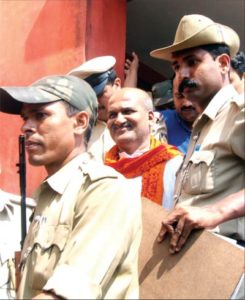 Medieval Mindset Ram Sene chief Pramod Muthalik outside a Mangalore court in connection with the pub attack case. Photos: RK Bhat
Medieval Mindset Ram Sene chief Pramod Muthalik outside a Mangalore court in connection with the pub attack case. Photos: RK BhatThere are 133 videos that show up on YouTube when you search for “Mangalore pub attack”. Over 300,000 people have viewed the first video. Put in the same query on Google and 69,000 websites show up in a fraction of a second.
On 24 January 2009, a group of 35-40 men barged into a pub in Mangalore and attacked young women as they enjoyed an afternoon drink. Amongst the attackers were members of Sri Ram Sene — a right-wing organisation that was relatively unknown at the time. The Sene cadres considered women drinking publicly as “indecent behaviour” and more importantly “an insult to Hindu culture and tradition”. Two days after the attack, as India marked 60 years of the Constitution coming into force, national television channels looped footage of women being slapped, beaten and chased out of the pub. (In a telling detail, the footage of the assault was available only because the Sene had informed journalists and photographers in Mangalore of their intended attack 30 minutes before they entered the pub.) The footage sparked outrage. News producers from French, Russian, German television channels despatched correspondents to ground zero. Even producers from The Oprah Winfrey Show called in asking for the footage. The Sene had burst onto the scene.
A six-week undercover investigation by TEHELKA, however, reveals that even this violent, spitfire morality can be a hypocritical shame. Sri Ram Sene members are not just committed ideologues who are spontaneously willing to become violent law-breakers for a “cause”. That’s just one of their criminal and negative faces. They are also cynical lumpen that can be bought for a price. “Contract rioting” — thugs being handed out contracts or money to create riots — no longer needs to be a matter of mere speculation. TEHELKA’s investigation shows it is an alarming reality. Vandalism can be purchased; ‘cultural nationalism’ can go on sale. It’s all kosher in the “business” of outrage.
| ‘I cannot get involved directly, I have an image to maintain, I have a certain credibility in society. People look up to me as a man of principles, an idealist, a Hindutvawadi’ – Pramod Muthalik, National President, Sri Ram Sene |
To expose this aspect of the Sri Ram Sene, a TEHELKA journalist posing as an artist met Pramod Muthalik, the president of the Sri Ram Sene, with a proposal. Using the rationale that all controversy is good publicity, he asked Muthalik if the Sri Ram Sene would orchestrate a pre-paid, pre-meditated attack on his painting exhibition so that the resulting furore would spark public interest, catapult him to fame and help sell his paintings both in India and abroad by attracting higher bids at art auctions. (Never mind that the supposed paintings this furore might help sell evoked Hindu-Muslim amity, particularly Hindu-Muslim marriages — a phenomenon the Sene abhors.) In return, Muthalik and the Sene would regain the national stature they had achieved during the Mangalore pub attack, besides pocketing the agreed upon fee. Far from rejecting this proposal with horror and outrage, Muthalik readily connected the TEHELKA reporter to one Sene member after another — down a food chain that exposed a disturbingly entrenched criminal mindset, which is confident of fixing the system to abet it.
Before the story of what this food chain threw up, however, it might help to revisit the history of the Sri Ram Sene and its founder.
The Sri Ram Sene was started in 2007 by Pramod Muthalik, who continues to be its National President. Born in Bagalkot in north Karnataka, Muthalik spent his formative years — he joined a shakha when he was 13 years old — with the Hindu right wing organisation, Rashtriya Swayamsevak Sangh (RSS). By 1996, his RSS seniors shifted Muthalik to its paramilitary wing, the Bajrang Dal. It took Muthalik less than a year to be named the Dal’s south India convener. People who knew him back then called him “ambitious, dedicated and sharp-tongued”. In his 23-year association with the RSS and its affiliate organisations, Muthalik had several brushes with the law, but despite being charged in numerous cases for provocative speech-making, the only significant time he has spent in jail is two months — a record he maintains till date.
Upset with the BJP’s failure to reward his Hindutva zeal with any political dividends, Muthalik severed ties with the RSS in 2004. He claims the RSS and its affiliate organisations are betraying the Hindu cause by not being hardline enough, and the BJP government in the state too is not helping him enough. Predictably then, extreme hardline Hindutva politics has been the cornerstone of the Sri Ram Sene since it was floated in 2007. Violence is the only way forward, says Muthalik. In 2008, attempting to enter political centre stage, Muthalik floated the Rashtriya Hindustan Sena — the political wing of the Sene — but failed miserably. None of the candidates fielded made a mark. While talking to TEHELKA, Muthalik admits on camera that his candidates lost the state Assembly elections because “we need money, religion and thugs to succeed. We didn’t know that. Today’s political situation is a wretched one.”
 Mob For Hire The attack on Mangalore’s Amnesia Pub in 2009 by Bajrang Dal, Sri Ram Sene and others brought the SRS to national prominence
Mob For Hire The attack on Mangalore’s Amnesia Pub in 2009 by Bajrang Dal, Sri Ram Sene and others brought the SRS to national prominenceResolving to return to electoral politics after establishing himself more stridently, Muthalik and the Sene launched a series of plans to strengthen its “Hindu” identity. Though the organisation is most strongly rooted in the coastal Karnataka region and pockets of north Karnataka, their activities have not been limited to these regions. On August 24, 2008, in Delhi, a few Sene members barged into an art exhibition organised by SAHMAT an NGO, and destroyed several MF Husain paintings, leaving behind a clutch of pamphlets denouncing Husain’s attempts to hurt Hindu pride. A month later in September, speaking at a public event in Mangalore, Muthalik referred to the Bengaluru bomb blasts that had taken place a week earlier and declared 700 Sene members were being trained to carry out suicide attacks. “We have no more patience. Tit for tat is the only mantra before us to save Hinduism,” he had announced. “If centres of religious importance for Hindus are targeted, twice the number of religious centres of the opposite party will be smashed. If Hindu girls are exploited by the members of other religions, double the number of girls from other religions will be targeted.”
 Sri Ram Sene national vice-president Prasad Attavar
Sri Ram Sene national vice-president Prasad AttavarMonths later, in January 2009, the Karnataka police arrested nine people in connection with bomb blasts that exploded in Hubli during the state Assembly elections. The kingpin, Nagaraj Jambagi, was a Sene member and a close Muthalik associate — a fact Muthalik himself had admitted to at the time. In July 2009, Jambagi was murdered while serving time in Bagalokot Jail.
During the Mangalore pub attack, minutes before he was arrested for inciting his cadres, Muthalik had asked newspersons gathered at the scene why everybody was making such a big issue of the attacks. “We took steps to protect our Hindu culture and punished girls who were attempting to destroy that tradition by going to pubs. We will not tolerate anybody who steps out of this code of decency,” he said then.
This Muthalik-prescribed code of “decency” is still being enforced in several ways in coastal Karnataka. In Mangalore, Sene cadres walked into a Hindu wedding celebration on July 15, 2009, and assaulted a Muslim guest for attending the event. Muslim boys, in fact, are often beaten up across the region merely for talking to Hindu girls. And they have whipped up anxiety and anger about a derisive concept called “Love Jihad”— a conspiracy allegedly evolved by Muslim boys to convert Hindu girls to Islam through proposals of marriage — through vicious attacks and propaganda.
As part of the investigation then, the TEHELKA journalist posing as an artist declared his forthcoming exhibition would be on positive images of “Love Jihad”. But it did not seem to bother Muthalik — or any of the Sene members TEHELKA met — that their help was being sought to boost sales of paintings on a theme they claimed to ideologically oppose. For a man who frequently talks of how he does not have a single bank account in his name and depends entirely on public contributions, Muthalik’s easy acceptance of the proposal is a telling comment in many ways.
Here is how the story unfurled once TEHELKA met with Muthalik.
TEHELKA first met with Muthalik at the Sene office in Hubli. Before laying out the proposal of a preengineered attack on the art exhibition, a cash donation of Rs 10,000 is offered to Muthalik — “Hindutva ke liye hum bhi kuch karen (We want to do our bit for Hindutva).” Muthalik immediately reaches for the money and puts it in his pocket, without even a token refusal.
 ‘Sri Ram Sene has a very good team in place, whatever you want we will deliver. We have a setting for everything. There is only one problem — money problem’ – Kumar, Sri Ram Sene member, Mangalore
‘Sri Ram Sene has a very good team in place, whatever you want we will deliver. We have a setting for everything. There is only one problem — money problem’ – Kumar, Sri Ram Sene member, MangaloreOver the course of the conversation, a detailed proposal is suggested that could potentially be a mutually beneficial proposition. Muthalik betrays no surprise or shock — not even when the reporter suggests that the art exhibition should be organised in a Muslim-dominated area in Bengaluru for the impact of the attack to be maximised. Muthalik’s only response to the suggestion is — “Yes, we can do it. In Mangalore as well.” The acceptance and the suggestion of Mangalore, another city where the attack can be staged, are instantaneous. Within the next five minutes, Muthalik offers to depute the task of coordination and suggests taking the discussion forward to two Sene leaders — Vasantkumar Bhavani, the President of the Bengaluru city unit, and Prasad Attavar, the Sene vice-president, who is based out of Mangalore.
(Though the conversations are in Hindi, the transcripts have been translated into English here for the purpose of the story.)
TEHELKA: I’ll take leave sir, what I want is to gain popularity and if I get popularity my business will improve. If you say then I…just tell me a time limit… these many boys will be there…this much for advo…meaning that of lawyers…we will not even complain… because that is our understanding… but sir, it is that whatever you say that amount of advance I will leave with you, then I say to you that now it has all come to you, and sir now do the job…
MUTHALIK: Can do it in Mangalore, Bangalore…
TEHELKA: I can get more popularity in the Shivaji Nagar area of Bangalore… because that whole area is theirs…the Muslims. If you give one statement in the press and 10 of your workers reach there…we will shut it down…what is it to us? But at least we will get popularity.
MUTHALIK: Yes, that can be done…
TEHELKA: So sir, just tell me straight up…or tell me to come after two or four days….tell me for certain that ‘This is my expense… you do this much…’ so sir, I’ll complete it and plan it all out…
MUTHALIK: What I’m telling you, our president there…
TEHELKA: of Bangalore?
MUTHALIK: Of Bangalore…he is also very strong…on speaking to him…all three of us — you, me and him — will sit and plan out what is to be done…then we will do it…definitely do it
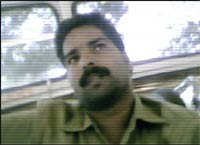 ‘I worked in the RSS first in 1996, then the Bajrang Dal. I was in the main team that attacked the Mangalore pub. But my name is not there in the police case, I was never arrested’ – Sudhir Pujari, Sri Ram Sene member, Mangalore
‘I worked in the RSS first in 1996, then the Bajrang Dal. I was in the main team that attacked the Mangalore pub. But my name is not there in the police case, I was never arrested’ – Sudhir Pujari, Sri Ram Sene member, MangaloreThe hour long conversation is peppered with choice abuses and a vitriolic diatribe against Muslims and their “plans to divide the country”. Love jihad, Muthalik tells TEHELKA, is the Muslims’ way of conquering over Hindus, by increasing their own population. Muslims, he continues, pursue Hindu Brahmin or Jain girls so that their children can inherit their brains and be intellectually sharp to help them in their mission.
According to him, this calculated strategy by Muslims was taking place across the country with increasing frequency. When TEHELKA asks him why Hindu boys were not engaging in a similar counteractivity, Muthalik said the Sri Ram Sene was now inspiring Hindu boys to pursue Muslim girls.
Over this conversation, TEHELKA repeated its proposal several times — opportunities were given to Muthalik to decline the offer of money. But Muthalik offers to brief other Sene associates, who will play definitive roles in the execution of the plan, and connect them with TEHELKA. The date for the next meeting is fixed and personal phone numbers are exchanged. Muthalik asks TEHELKA to return a week later.
He is categorical that, as the National President of the Sene, he is conscious of the trouble he will be in if he is caught planning details of the operation, so he says he will talk over specifics with his associates Prasad Attavar, Vasanthkumar Bhavani and Jeetesh and then put them on to TEHELKA. Throughout there is no ambiguity that Muthalik heads the chain of command and that the final decisionmaking power rests with him.
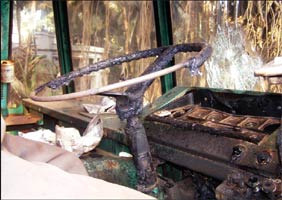 Public Loss The charred remains of a bus vandalised after Attavar’s arrest in the wake of the pub attack
Public Loss The charred remains of a bus vandalised after Attavar’s arrest in the wake of the pub attackDespite Muthalik’s intervention, connecting with Prasad Attavar, the National Vice-President of Sri Ram Sene, was no easy task. He treats almost everyone with suspicion and consequently never answers any of his mobile phones. Therefore, it took TEHELKA several days to catch up with him. Considered to be a close associate of Muthalik, Attavar is credited with leading the Sene to notoriety in Mangalore. Having been with the Sri Ram Sene since its inception in 2007, Attavar exercises tremendous control over the Sene cadres. In Mangalore, Attavar runs a security agency in partnership with another Sene member. Unlike several others, he is not dependent on the Sene for financial stability. In January 2009, Attavar openly claimed responsibility for the Mangalore pub attack. When another TEHELKA reporter had contacted him for a story at the time, Attavar had even claimed responsibility for planning the attack. He had called the media to the spot himself, he said. Days later, Attavar and 27 others, including Muthalik, were arrested for their role in the pub attack. A week later, when a Mangalore city magistrate granted them bail, Attavar and the others were accorded a hero’s welcome.
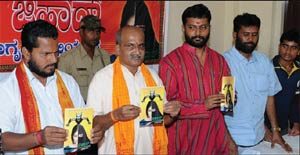 Hate-Mongers Muthalik and other Sene members display propaganda material against ‘Love Jihad’
Hate-Mongers Muthalik and other Sene members display propaganda material against ‘Love Jihad’When contact was finally made with Attavar, a Sene cadre called Jeetesh was sent to take TEHELKA to a nondescript hotel in Mangalore for the meeting. A few minutes into the conversation, it became evident that Attavar was evading arrest — a warrant had been issued against him. The police had charged him with executing the orders of an underworld don, Ravi Pujari. Pujari is rumoured to have worked with Mumbai gangster Chhota Rajan, and later with Dawood Ibrahim, before establishing his own empire. Besides having interests in the tourism and hospitality sector, Pujari allegedly also has interests in Karnataka’s real estate industry. As Pujari’s associate, Attavar has been accused of threatening businessmen and builders in Karnataka’s coastal region as part of an extortion racket that is controlled from outside India.
Having been briefed by Muthalik, Attavar is completely aware of the TEHELKA reporter’s proposal from the first moment of conversation. His suggestions therefore are concrete and to the point. He offers a choice of organising the exhibition (and the attack) outside Karnataka as well. “We can do it in Mumbai, Kolkata or Orissa as well,” he says.
When TEHELKA suggests the impact of the planned attack against the artist would be enhanced considerably if an engineered threat could be issued by his associate, Ravi Pujari, Attavar agrees it is doable — thereby confirming his proximity with the don.
A minute later, he talks how the police need to be taken into confidence: they have to be “set”. Additionally, the boys who will participate in the attack have to be from outside Mangalore, he says.
TEHELKA: We don’t have to go to the police, neither do we have to do a case… so if a case is filed it won’t stand because there is no party in front… we people will not identify…
ATTAVAR: That setting with the department I’ll do….
| ‘I will tell you how much money is needed. It will be like the Mangalore pub attack, even better. You will get full national media coverage, I assure you. I’ll do all the setting for you’ – Prasad Attavar, National Vice-President, Sri Ram Sene |
Six days after this meeting with TEHELKA, Attavar was arrested by the Mangalore police, taken to Mangalore Jail and then remanded to judicial custody. He was placed in Bellary Jail — considered to be one of Karnataka’s high-security prisons. Throughout, however, Attavar continued to maintain contact with TEHELKA and TEHELKA managed to meet with Attavar both in the Mangalore and Bellary jails. At the meeting in Mangalore Jail, when TEHELKA asked if Rs 50 lakh would be enough to organise the riots in two different cities, Attavar’s answer is inconclusive. He asks for more time to return with a final figure. “I will calculate the final amount and let you know,” is all he will finally agree to. The discussion revolves around the final amount — there is no opposition to the proposal at all.
PRASAD: What all is to be done…does arrangement for hotel need to be done?
TEHELKA: No that I’ll do…your input will only be the team and the rest…
TEHELKA: We need to create a riot…we have to have violence…50 lakh is being spent on two cities..
PRASAD: In Mangalore …
TEHELKA: Yes about 200 workers should be there…at the time of the exhibition…
PRASAD: Yes…
At Bellary Jail, a mere payment of Rs 2,500 to some wardens and SN Hullur, the Superintendent at Bellary Jail is sufficient to set up a meeting with Attavar in a separate discussion room. (So much for the norms of a high-security jail). At this meeting, Attavar says he has no money and asks the TEHELKA reporter for some money to tide him over. The reporter gives him Rs 3,000. After this meeting in the jail, Attavar frequently texted TEHELKA asking the reporter to call back. Alarmingly, both accessibility and mobile connectivity within a high security prison seemed easy for Attavar. His advocate, Sanjay Solanki later told TEHELKA that Attavar’s access to mobile phones was possible as Superintendent SN Hullur had been handsomely paid. (TEHELKA has not corroborated this independently.)
A few days after the meeting with Muthalik, TEHELKA also connected with Vasantkumar Bhavani, the Bengaluru city unit head of the Sri Ram Sene. Bhavani is the Sene’s de facto public relations man. He is fluent in English and Hindi and lives in Bengaluru. Immediately after the pub attacks in Mangalore, Bhavani had travelled from one television studio to another, staunchly defending the Sene’s action and its ideology. In one memorable live interview, when a women’s rights activist challenged the Sene’s ideology by saying alcohol had long been a part of Hindu traditions, Bhavani’s specious rebuttal silenced her completely: “Go ask your grandmother to drink alcohol. I will buy her a drink myself.” The sheer ridiculousness of Bhavani’s arguments coupled with his vehemence made him a hot favourite with most media channels at the time.
A realtor by profession, Bhavani is considerably wealthy and, like Attavar, does not depend on the Sene to back him financially. Ask him for the numerical strength of Sene cadres in Bengaluru and there are no answers forthcoming. “Even Pramod [Muthalik] does not ask me that question. Dealing with numbers is unnecessary. My boys will be in trouble if the police realises our true strength,” he says. (In February this year, when the Sene announced its usual opposition to Valentine’s Day celebrations, the police rounded up 400 men as part of its preventive arrests.)
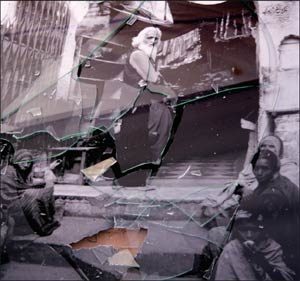 Recall Factor Sri Ram Sene members deface posters and paintings of MF Husain at an exhibition organised by SAHMAT in Delhi in 2008. Photo: Shailendra Pandey
Recall Factor Sri Ram Sene members deface posters and paintings of MF Husain at an exhibition organised by SAHMAT in Delhi in 2008. Photo: Shailendra PandeyA fortnight before TEHELKA met with Bhavani, he had led a Sene protest in Bengaluru against Muthalik’s humiliation. (In an unfortunate incident that mirrored their own intolerant politics, Muthalik’s face had been blackened by members of the Karnataka State Youth Congress during a television debate on Valentine’s Day celebrations. Bhavani and several others had been arrested during the Sene’s counter-protests.)
In his conversation with TEHELKA, the talk revolves cynically around the specifics of the planned attack in Bengaluru and how its impact can best be maximised. Here’s what Bhavani suggests:
BHAVANI: You know Ravindra Kalashetra, right?
TEHELKA: Yes, Yes…
BHAVANI: Behind it is an open stage.
TEHELKA: How many people can that accommodate?
BHAVANI: Two thousand…
TEHELKA: Two thousand… but is that communally sensitive?
BHAVANI: It is also communally sensitive… the market is also close by from there…
TEHELKA: City market?
BHAVANI: City market…
TEHELKA: Yes, there’s a Muslim area there…
BHAVANI: That is why that place is very good for you… the scope there is much better than in Shivaji Nagar because in the close by areas the Muslim population is very high.
TEHELKA: Yes, in city market it is… but the area there is mostly commercial?
BHAVANI: It suits to what you have in mind…
TEHELKA: It suits the profile that we have…
BHAVANI: It suits that better than Shivaji Nagar… Shivaji Nagar is a remote area whereas this is more suitable it suits your purpose.
TEHELKA: If it is done in Shivaji Nagar it will look like there is not much educated class there so why do it there… if it is done in city market.
BHAVANI: This is matching your idea and your concept… because illiterates will not come and watch your gallery… who will watch it are your upper class… middle class.
TEHELKA: Elite class…
BHAVANI: It will mostly be the upper class… so upper class… if you keep it in Shivaji Nagar, who will come and watch it… it will look preplanned to everybody…
TEHELKA: Hmmm…
BHAVANI: If done in Shivaji Nagar… if looked at from a different direction it seems right… but it will not get much publicity…
TEHELKA: Yes people might think… that it is an under-table alliance
BHAVANI: Could look like that….
Having secured an agreement on the venue, a discussion on dates follows. Referring to the calendar on his phone, Bhavani politely asks us for our preference — weekdays or weekends? — before suggesting weekends himself. More people are likely to attend art exhibitions on weekends, he says. Venue and dates out of the way, Bhavani methodically moves on to plan the protest itself. When TEHELKA asks if inaugurating the exhibition by a Muslim community leader or politician will raise the octane of the event and attack, Bhavani not only approves, he has suggestions of his own:
 ‘I was charged under IPC Section 307, half murder, for the Kasargod clash. I killed two or three people with a sword. They attacked two of our men, so we got two of theirs’ – Jeetesh, Udupi unit head, Sri Ram Sene
‘I was charged under IPC Section 307, half murder, for the Kasargod clash. I killed two or three people with a sword. They attacked two of our men, so we got two of theirs’ – Jeetesh, Udupi unit head, Sri Ram SeneTEHELKA: In this programme, Vasant, I need public beating for sure, because as your trademark is and I want to call a Muslim leader for the inauguration, so some people from the Muslim community will be there… there is Prof Hujra at IIM.
BHAVANI: Why don’t you call Mumtaj Ali…
TEHELKA: Who…
BHAVANI: Mumtaj Ali Khan…
TEHELKA: Who is he?
BHAVANI: The minister of Waqf board… now.
TEHELKA: From Karnataka?
BHAVANI: Yes.
TEHELKA: He will come… How old would Mumtaj Ali be?
TEHELKA: Above 50…
TEHELKA: 50-plus… Is he an MLC or MLA?
BHAVANI: Being an MLC… he is a backdoor entry… he is a minister… Huj committee or Waqf Board…
TEHELKA: Apart from him, wasn’t there another one who became Rail Minister…
BHAVANI: CK Jaffar…
TEHELKA: Jaffar Sharief…
BHAVANI: He is too old now…
Bhavani also asserts that other preparations are necessary as well. Ominously, for instance, an ambulance at the venue:
BHAVANI: Like if you keep Husain’s name itself it will be good… will make it popular.
TEHELKA: No, if we keep Husain, I will not get the ‘mileage’, instead he will get the ‘mileage’…
BHAVANI: Mileage will go to him… I cannot give assurance for this… how much damage you will bear… there will be damage… but how much that I cannot guarantee… because our boys are very ferocious boys… they don’t look left or right…
TEHELKA: If it is to be done, it is to be done…
BHAVANI: Done… I cannot avoid them also because they will get annoyed with me then… if the leader is ferocious, the followers will also be ferocious… this much I want to tell you… there will be damage, but how mach I cannot say…
TEHELKA: Can there be public beatings…
VASANT: Can be done… whoever they find there… because our boys do all this also…
TEHELKA: If there is a crowd, they cannot control themselves, right?
BHAVANI: No, usually they can’t…
TEHELKA: Will we have to keep an ambulance ready?
BHAVANI: Absolutely… that can also happen… after all, they are my boys… if they take any task in hand… then… you have to tell them… you have to make them understand… more cases will add on… already there are lots of pending cases… try and control… only target whatever is on display…
TEHELKA: Do damage…
BHAVANI: Do damage… do not touch the people…
TEHELKA: But they usually don’t listen
BHAVANI: I’ll make them understand this much, but I can’t ensure… there is someone or the other… who damage whatever comes in front… such lunatics they are…
TEHELKA: That means I need to keep an ambulance ready in advance… should keep that in mind…
There is further evidence of the Sene’s preparedness and calculated approach to protests and destructive violence. While discussing the aftermath of the attacks, when TEHELKA offers to not file cases against the Sene, Bhavani turns down the suggestion. If cases aren’t filed against the attackers, people will suspect that the attack has been pre-engineered, he says. It doesn’t matter if they are hauled to court, Bhavani reassures. They are prepared to deal with such conditions and TEHELKA would be handed instructions by them on how to deal with the legalities and fallout once the attack has proven successful.
| ‘If we can agree on an amount, then I will talk to my boss, Muthalik. He gives us the green signal for action but the screen script is all ready with him. You think about your offer’ – Vasantkumar Bhavani, Ram Sene head, Bengaluru |
TEHELKA: From our side in this gallery programme… whatever riot happens inside the art gallery, we are not going to register a case… when there is no rival party…
VASANT: You will have to register a case…
(A discussion follows this assertion on how Attavar, Bhavani’s counterpart in the group, suggests a different approach)
TEHELKA: So a case needs to be registered?
VASANT: You will have to file it… if there is a wrongdoing, a case has to be filed…
TEHELKA: Don’t you think it’s going to be very complicated then?
VASANT: It has to be complicated then only the purpose will be solved… once inside the water, whats the point of fearing the depth…
TEHELKA: Ok, whatever you say… but coming to court regularly, standing there… for any man it will be a very difficult task to come 3,000 km to attend the court cases…
VASANT: We will give you a way out of that… once this turns out to be a success, I will sit and explain it to you… what is to done, how it needs to be done…
TEHELKA: Set any of the local lawyers who gets the date extended… will keep on happening…
VASANT: I will tell you… I will explain it to you… I will explain to you what has to be done and how it has to be done..
TEHELKA: Ok.
VASANT: But you have to be mentally prepared…
Minutes later, Bhavani proceeds to discuss the “fees” with TEHELKA.
“Give me a figure so I can take the discussion forward with sir [Muthalik],” Bhavani says. The TEHELKA reporter writes Rs 70 lakh on a sheet of paper and pushes it towards Bhavani. His immediate response is to ask how much has been offered to Attavar, the Sene National vice-president and the pointperson in Mangalore. (Though the figure written by the reporter on paper is not visible on camera, the offer is corroborated on camera in a later conversation with Muthalik.) When he is informed that the same amount was offered to Attavar too, Bhavani dismisses it saying, “Attavar will never settle for this amount.” Bhavani then insists that TEHELKA should also set aside money to pay off the police:
TEHELKA: They told me two lines… separate for organisation (SRS)… separate for the workers… so I said five lakh for the organisation… so they said they will see… on the level of the workers, if there is a case then fair enough, we will give Rs 50,000 to each worker… some will go to him and some can be used in the case… if 10 boys come then five lakh… what he suggested… what your dealings are with the organisation, you discuss with Muthalikji himself… as for the boys… that I will give you… the arrangement with the police… that also I will do… will have to be done…
BHAVANI: The police will also be managed… without that, it cannot be done…
TEHELKA: I agree, so the money is going in three phases… separately for the organisation… separately for the workers… and separately for the police?
BHAVANI: Separately for the police…
Yet another discussion follows on the modes of payment. The TEHELKA reporter asks if the fee for the riot can be paid by cheque instead of cash. Bhavani refuses categorically. The business of outrage obviously cannot be transacted through legal financial instruments.
The methodical approach with which these Sri Ram Sene functionaries approached TEHELKA’s proposal could be an indication of the organisation’s engagement with similar activities in the past. At the very least, it exposes the Sene’s adroitness in dealing with the law and the police — and the loopholes it slips through whenever it engages in violence.
TEHELKA’s conversations with Sri Ram Sene cadres in Udupi and Mangalore reaffirmed this very strongly. After TEHELKA spoke with Attavar, Jeetesh — the head of the Sene’s Udupi unit — agreed to introduce TEHELKA to Sene cadres who would ultimately execute the attack. Kumar and Sudhir Poojari, two such cadres, spoke freely of their involvement in earlier Sene attacks, including the infamous pub attack on January 24, 2009. All three — Jeetesh, Poojari and Kumar — had evaded police arrest despite having been part of the pub attack. All three had also spent several years with the RSS and Bajrang Dal before joining the Sri Ram Sene.
A minute into the conversation, Kumar and Poojari brag about how they gave the police the slip. Kumar also talks of his involvement in a previous incident that left eight Muslims injured. “They had to be admitted in the hospital,” he says, “after we attacked them.”
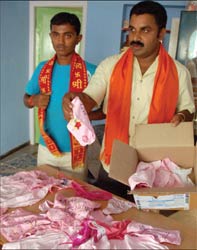 Saffron Gets Pink Sri Ram Sene members check out the pink undergarments gifted to them as a mark of protest against their attack on women at a Mangalore pub. Photo: KPN
Saffron Gets Pink Sri Ram Sene members check out the pink undergarments gifted to them as a mark of protest against their attack on women at a Mangalore pub. Photo: KPNJeetesh has several similar stories. A day earlier, in his meeting with TEHELKA, Jeetesh talked openly of an incident in 2007 when he and two others had attacked a church where they believed coerced conversions were taking place. According to him, three or four pastors were hospitalised after the attack, while Jeetesh and his cohorts were handed jail terms. A few minutes later, he recounts an even more gruesome incident. Jeetesh, then a resident of Kasargod in Kerala and a member of the Bajrang Dal, was involved in an attack on a mosque. In a calm voice, he tells TEHELKA about how he attacked a maulvi with a sword. The maulvi died and Jeetesh was charged with murder. After four months in jail, he was bailed out, he says. Throughout that period, he says he was supported by the Bajrang Dal with lawyers at hand to handle his bail applications. Once he was released, Jeetesh moved to Udupi. A few years later, when Muthalik started the Sri Ram Sene, he joined him. The conversation constantly hovers around a hatred for Muslims and Christians and their plans to take over the world.
As his comfort level increased, Jeetesh also shared another important piece of information. In 2006, along with 100 others, Jeetesh says he participated in an arms training camp organised by the Sri Ram Sene. The firearms they used at the camp were largely unlicensed, he said, but refused to volunteer any further details.
A day later, he accompanied TEHELKA to meet with Attavar, the Sene vice president, and plan the specifics of the proposed attack in Mangalore.
After the meetings with Attavar and Bhavani, where they agree to organise attacks in Bengaluru, Mangalore or Mysore, TEHELKA met with Muthalik again. The only issue left to clinch was the amount. While discussions with Attavar (inside Mangalore Jail) had pegged the cost between Rs 50 to 60 lakh, the negotiation with Bhavani had been for Rs 70 lakh. TEHELKA asks Muthalik if these sums are agreeable to him.
TEHELKA: Sir, is it ok if we remain in touch over the phone with Prasadji? Because, sir, I refrain from calling over the phone…
MUTHALIK: Yes …yes…
TEHELKA: Well with… Prasadji… fine… but I just wanted to confirm with you, maybe Sharmaji won’t appreciate it, but I wanted to have clarity about money… because I was told Rs 60 lakh for three locations.
MUTHALIK: Haaan.
TEHELKA: Rs 60 lakh… it’s ok from your side?
MUTHALIK: Who told you about it?
TEHELKA: Vasantji had told…
MUTHALIK: Yes… yes.
TEHELKA: So I decided to confirm once again…
MUTHALIK: Yes… yes… I can’t tell about the money… it’s their job only they can do it…
As the story goes to press, Attavar and his advocate Sanjay Solanki have continued to be in touch about the modalities and fees for planning the attack. In the last conversation, Solanki told TEHELKA that Attavar’s bail application pending with the Karnataka High Court would be accepted. Solanki categorically mentions that they will try and manage the judicial process and have already committed Rs 1.5 lakh to that process (TEHELKA has not corroborated this independently — this could be a wild claim for all we know). Advocate Solanki also assured TEHELKA that a conversation with Attavar — which would clinch the deal and close on the final terms of payment — would be possible very soon.
Needless to say, TEHELKA did not pursue the discussion.
With additional reporting by K Ashish
—
This article was originally published in Tehelka, a leading independent news magazine in India, known for its investigative journalism.
